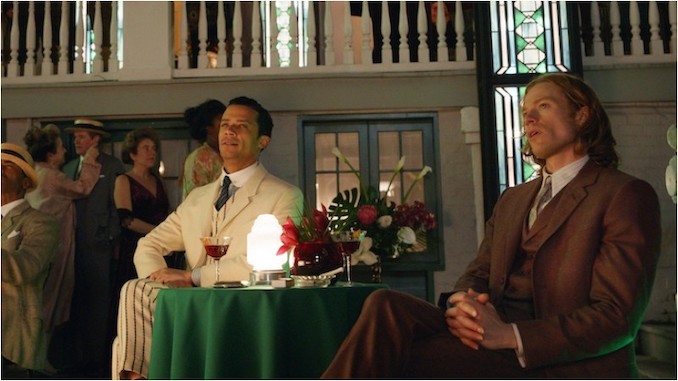AMC’s Interview with the Vampire Is a Blood-Soaked, Unabashedly Queer Delight
Photo: AMC Networks
When the news first broke that AMC Networks was adapting Anne Rice’s Interview with the Vampire for television, some fans (read: me) were understandably skeptical. Say what you will about the original novel, the dozen or so sequels of varying quality that followed after it, or the 1994 Neil Jordan film that starred Tom Cruise and Brad Pitt, but they were certainly all memorable and incredibly influential, garnering legions of fans worldwide and establishing Rice as the grand dame of contemporary vampire fiction whose influence can still be felt in the many popular fanged projects on the screen and page today.
So let’s just put it out there: Anne Rice’s Interview with the Vampire is incredibly good. Better-than-my-wildest-expectations good. The kind of good that makes me downright giddy that my initial assumptions about what kind of show this would be were so wildly off. This series is the absolute best kind of adaptation, one that hangs on to the original’s truest elements even as it uses its source material to say something new about this story, these characters, and even the world we live in now. It is better than I ever dreamed it would or could be and my hat is off to creator Rolin Jones for doing something I would have said a month ago was impossible.
(Sorry, world, I am apparently fully back on my Anne Rice bullshit again. Teenage me would be losing her mind. Bring on the Mayfair witches!)
The basic premise of the series is both simple and deeply familiar: A vampire named Louis de Pont du Lac (Jacob Anderson) is recounting the specifics of his long and complex existence to a reporter named Daniel Molloy (Eric Bogosian). Yet in this version, almost everything has changed. Decades have passed since the two sat down for the 1973 interview depicted in Rice’s novel, which, in the world of the show, was never completed. Louis has since abandoned San Francisco for a lush penthouse in Dubai and seems to have found some inner peace along the way. Daniel, freshly diagnosed with Parkinson’s and having spent a lifetime reckoning with substance abuse problems and failed relationships, has found a new perspective on both his own life and Louis’s story. He agrees to sit back down for a second conversation, framed as both a fresh start and a chance for both men to reexamine the legacy of their lives.
It’s unfortunate that its interview framing is often Interview’s least interesting element, given that Bogosian is a master of the sort of well-placed eyeroll and dry aside that easily undercuts Louis’ most pompous storytelling quirks. (His utter lack of surprise at the revelation that Louis and his maker, Sam Reid’s Lestat, were actually lovers is one of many note-perfect small moments.) But it’s also difficult to imagine that anything could steal the limelight from the show’s decadent New Orleans of yesteryear and the fascinating undead creatures at its center, The story progresses the way you might expect: Louis, now intriguingly reimagined as a Black saloon and brothel owner rather than the white plantation master of the novel, is a man from a good family who keeps a roof over their heads via a business his church-going mother openly disdains.
When he meets Lestat de Lioncourt, a foppish, obscenely rich Frenchman, the two are immediately drawn to one another. Lestat realizes instantly both what Louis is and what he wants, and though Louis initially tries to resist the magnetic pull he feels toward the newcomer, the two eventually become inseparable. The cat-and-mouse courtship that develops is as strangely charming as it is dark. That they are doomed to spend eternity circling one another in some form or other seems obvious halfway through the series’ first episode, well before they move in together, let alone turn a dying child to create television’s most twisted blended family.
Anderson does a yeoman’s work as Louis, asked to play multiple versions of the character in any given episode—carefully drawing parallels between the removed, calculated modern-day Louis who, as the kids say has seen some shit, the volatile young vampire in the first flush of his transformation, and the furious Black gay man forced to deny himself on multiple levels in order to survive in a white man’s world. (This dude was wasted on Game of Thrones is what I’m saying.) Reid is a mercurial, magnetic presence—cruel, ridiculous, and thoroughly charming by turns—-with the sort of charisma that is so enthralling it makes Louis’s inability to ever truly cut ties with his maker ridiculously easy to understand.
-

-

-

-

-

-

-

-

-

-

-

-

-

-

-

-

-

-

-

-

-

-

-

-

-

-

-

-

-

-

-

-

-

-

-

-

-

-

-

-








































